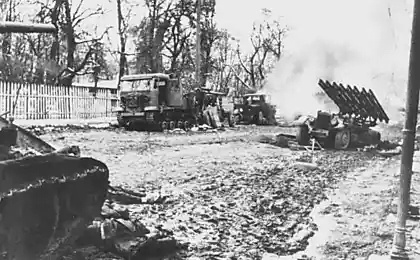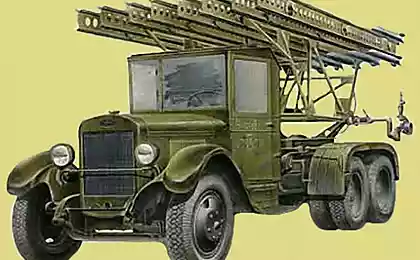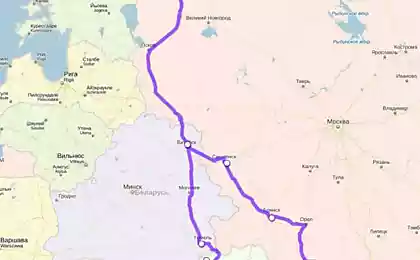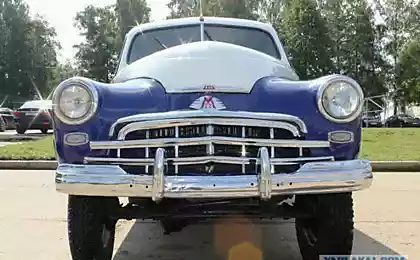1073
Katyusha (11 photos)
- Tell me, friend, why the name "Katyusha" your mortar? - I asked.
Victor paused, then looked at me a searching look, said:
- You probably will not believe what I was going to tell. This travel of various kinds. Here Yelnia, for example, where MLRs at the same time we made their first shots, too, for some reason, it's a new weapon called the "Katyusha". But in our sector of the front all that happened was some romantic connotation. At the foot soldiers in the first days of fighting was a nurse Katya. It featured a special neatness. About her jokingly said: sister, he says, carries with it an electric iron - so it all clean, ironed, fresh. Iron, however, no one has seen.
So, when he worked our setup, some wag joked that the difficult moment of the enemy attack the nurse decided to run for the Germans hid the electric iron. Of the iron and then the Red Army did not notice. But the heat of flying out of "Iron" in the direction of our trenches, observed by all. "Irons" fell on Fritz, as a terrible vengeance, and ironed with unprecedented effect.
When we began our counterattack, the Red Army with the running back and the nurse - blond, light. She seemed to be inspired by the Marines in this spontaneous, extremely powerful counterattack. Her name was all with the same tenderness Katusha. And many, like me after this fight seemed that the MLRs was in honor of our nurses so quickly, easily and securely christened it was a good Russian name.
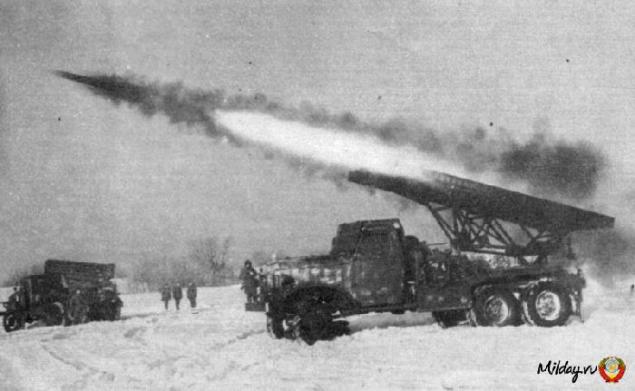
Night July 3, 1941 in Moscow on Mozhaisk highway came a strange appearance of the military. Her column is stretched out on the road for about two kilometers. At the head of the column had seven machines that resembled a farm some carefully sheltered huge cover of dark green tarpaulin. Then it went more than fifty cars long drawers, nestled as tarpaulins, fuel trucks, vehicles with soldiers, field kitchen and all sorts of economic assets. It is quite unusual in this column looked like one single howitzer.
- What part? - Interested in the soldiers and officers of other units on their way to front.- why rush?
- Pontoon - smartly answered from kolonny.- rush to the front, to build bridges on the road on which the fascists will go to hell.
- And what for howitzer hitched, warriors? The fish is, perhaps, turn off?
- The farm is useful ...
On the front was the first private rocket artillery battery, while only one in the Red Army and the world, of the artillery, which was later on the front and in the rear called affectionate name of "Katyusha". It was the ancestor of the new formidable Soviet weapons, which played a prominent role in the defeat of the fascist hordes and which now, transfigured and developed on a new basis, became the main firepower of the Soviet Armed Forces ...
Firstborn new weapons
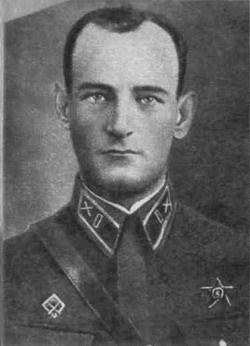
June 28th, 1941 Faculty listener command the Artillery Academy Dzerzhinsky Captain IA Flerov, has just successfully passed the exam for the first year of the academy, was urgently summoned to the headquarters of the commander of the artillery of the Red Army. There he was immediately carried to the office of General VV Aborenkova.
- I declare you have just signed an order - General began after Flerov introduced emu.- you first appointed commander of the Red Army in a separate battery of rocket artillery. You know what it is?
- No, Comrade General. Nothing was heard of such arms.
- It does not matter, will be introduced. Like any outstanding inventions, it is extremely simple to operate. However, the world is still no commander controlling such weapons. You will become the first officer, in whose hands is concentrated the fire unseen, a gigantic power. You passed all the fighting is now installed and ammunition.
- May I ask, Comrade General, where there is a battery and how much time I located her combat training?
- Batteries, my dear, not yet. There is only the order of its formation. And you will create it. Here in Moscow. You will be our representative - Colonel Krivoshapov and industry representatives, who together with you and go to the front to enter the battery in the fight.
The general got up, went to the captain, rose from his chair. Staring into his eyes, he said:
- To trust the military and state secrets of paramount importance. I stress paramount importance! Your part will be the progenitor of a new kind of troops, which owns a great future. In all circumstances the enemy should not get any information about this armed. The stalemate fighting installations and munitions batteries must be blown up.
Experienced martial installation of this new kind of weapons were created in 1939, but for various reasons have not arrived at the same time the Red Army. Only June 21, 1941 the Soviet government adopted a resolution on the mass production of missiles "M-13" and the combat units "BM-13».
Baptism of fire
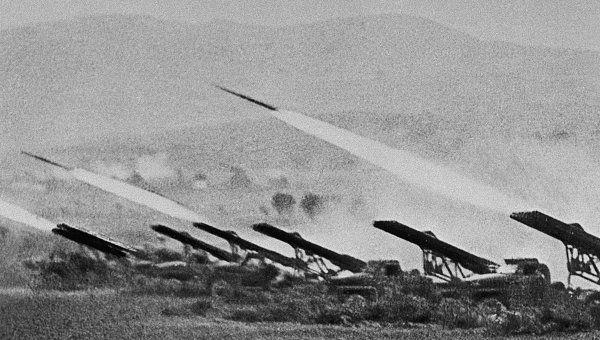
I wandered battery captain Flerov on the front line the roads, not finding a combat use.
Early in the morning of July 14, Lieutenant Colonel Krivoshapov captain Flerov went to the headquarters of the Western Front. There they took General GS caryophyllene.
- The Germans scored Orsha railway junction military echelons, - said the general order you to attack the purpose. Prepare well for possible salvo at crossings that Nazi troops erected across the Dnieper and Orshitsa. The challenge is clear?
- Jasna, Comrade General. The long-awaited battle of this work.
- So that's great! Proceed. I hope will be a successful baptism of fire.
In high spirits, and Flerov Krivoshapov returned to the battery and immediately went to the observation post. Martial installation uncovered and charged, went to the edge of the forest, and then to firing positions. The commander of the battery quickly prepared to fight all the calculations.
- Worried Ivan Andreyevich? - I asked Krivoshapov.
- A little worried, Alexander - frankly Flerov. - It is very tempting target, and had to wait for this moment for so long.
- Ready to Rumble! - Report to the captain commanding the firing squads.
- Note - said Flerov - fifteen hours fifteen minutes.
And right into the telephone:
- Volley!
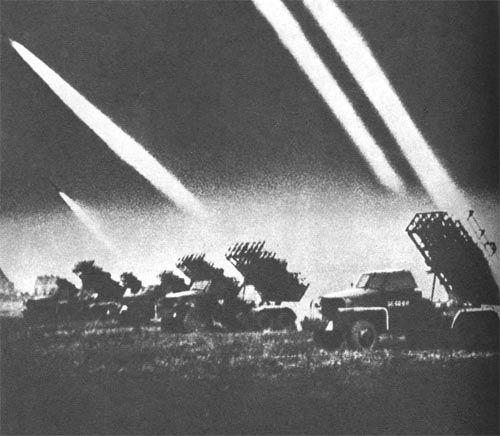
The hollow in firing positions batteries, came with nothing comparable to a deafening roar and rattle. It seemed that there was something quite extraordinary. Raised huge black cloud of smoke and dust. Top shot up about a hundred missiles reserves clearly visible whitish curly jet quickly dissolved gases in the air.
A few seconds after volley at the railway junction with a heavy roar and glare began to explode one after the other missiles thermite.
The earth groaned. She was shaking like a fever. Rockets explode in the midst of hundreds of cars with troops, military equipment, ammunition, fuel. All instantly it has been included in the sea roaring fire. It seemed that the fire is burning even metal.
Mad Nazi officers and soldiers rushed in panic between burning with trains, asphyxiated by the smoke and hot air. Soon they began to explode wagons with ammunition and fuel tanks.
After five or six minutes after the salvo battery railway hub turned into a sea of fire. In the sky clouds of thick smoke rose.
On that day, few of the Nazis caught up in the railway junction, managed to escape. The fire did not stop for almost three days. He has absorbed hundreds of enemy soldiers and officers and a huge amount of military equipment.
So there was a baptism of fire battery.
Observing the results of the volley, Captain Flerov said Lt. Col. Krivoshalovu:
- Perhaps, you can report to the commander of the artillery and the Supreme Command that Soviet engineers and workers have created an excellent weapon! Presumably, the echoes of panic that arose today, the Nazis in Orsha, and to reach Berlin.
- Be sure to reach, - said Krivoshapov. - And you feel it myself - the Nazis organize the daily hunt for your battery to capture it, and in extreme cases kill. Be prepared for this. And yet, the hunt for the battery has already started: see what's going on in firing positions.
Determine the position of some obscure weapons have not scattered black clouds of smoke and dust, came to his senses enemy gunners rained down on them a massive fire. There was a large group of bombers rained explosive and fragmentation bombs. But combat units was not there: they hid in the forest immediately after the volley ...
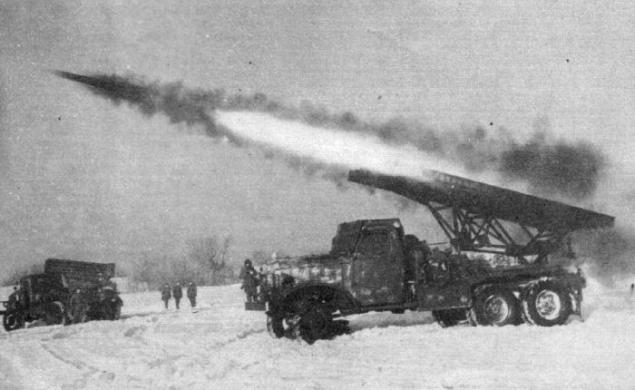
Fascist forces hammered the approaches to the crossing of the Orsha-tsu. A continuous stream of the river slowly moving tanks, vehicles and wagons with troops, ammunition and fuel, was the infantry. Some of these troops have already crossed to the east bank, is taking a small bridgehead. All ferry was packed with troops and military equipment.
Here and smashing a volley struck battery. Ferried blown to pieces. At the bottom of the river fell tanks and vehicles, carrying soldiers and officers. Dozens of rockets exploded on the banks of the river, causing death and destruction. Blaze tanks, vehicles with ammunition and fuel trucks. Among survived the Nazis began unimaginable panic.
Our took advantage of the favorable situation and caused a rapid attack on the Nazis, had time to cross to the east bank of the river. The prisoner was taken by a large group of enemy soldiers and officers.
Dejectedly walked Nazis under guard our soldiers. Having experienced the power of a devastating new Soviet weapons, they were mad with fear for a long time could not recover. Finally, one of them answered a question of our officer:
- It was a nightmare ... Not only our soldiers were panic-stricken. Even those who have been away from the ferry ran. It seemed that once fired hundreds of shells ...
The next day, Colonel Krivoshapov and industry to return to Moscow. Flerov was sorry to part with them, to the survivors of the hardships of forming the battery and putting it into action.
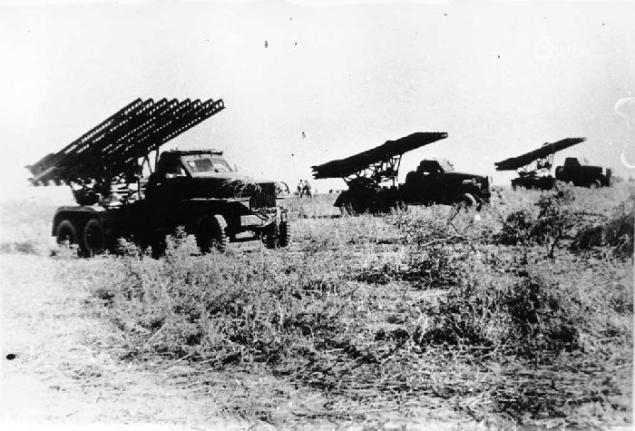
Soon after the first salvos battery captain Flerov Nazi Command to send troops directive "Russian have automatic multicore flamethrower gun ... Shot produce electricity. During the shot produced smoke ... The capture of such guns be reported immediately ... »
Early in the combat use of rocket artillery at the front gave conclusive results, although it is operated by separate panels. August 2nd, 1941 artillery commander of the Western Front denounced the artillery commander of the Red Army: a sudden fire batteries "M-13" causes great losses on the enemy, it turns into a stampede; Our part will come after volleys of these batteries, do not usually meet resistance enemy prisoners show that infantry panic runs not only from the areas in which fire a volley, but also with neighboring, at a distance of one-half kilometer from the place of the volley.
This powerful and maneuverable firepower, the Red Army has never had. His appearance on the battlefield was one of the largest makers of creative victories of Soviet arms.
Trapped
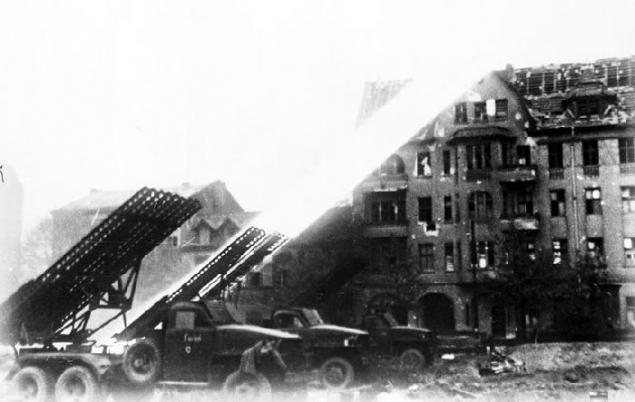
In many battles could participate battery captain Flerov: Smolensk, again near Orsha, near the famous Solovevsk while crossing the Dnieper in the counterattack by our troops Yelnia under Roslavl.
That just did not take fascist command to capture or destroy the battery Flyorova "hellish meat grinder," as the Germans called the new Soviet weapons. The fierce aerial bombardment and shelling of its hurricane firing positions after each volley, dele subversive groups, scattering leaflets from planes with calls to surrender these weapons fascist command or even destroy it. Traitors who would perform this task, the Nazis promised the highest orders of the fascist army, huge sums of money and sending to the rear of the German "to enjoy all the benefits of life».
However, the battery remained invulnerable. She always had time to escape the bombing and shelling. Soldiers and officers of the battery sometimes their own, sometimes with the help of neighboring departments were caught and destroyed the enemy saboteurs and fliers with lavish promises of Hitler's command was collected and burned.
In October 1941, the fate of the battery tragically cut short, and, until recently, this one did not know much. It was known only one thing: on the night of October 3, 1941 battery is left in a band fighting the 43rd Army on the Western Front in the direction of the town of Roslavl, the day the relationship with her was lost and restore it failed. The fate of the personnel of the battery did not reliably known. Not preserved any documents about the combat activities of the batteries.
What happened to the battery captain Flerov at the beginning of October 1941?
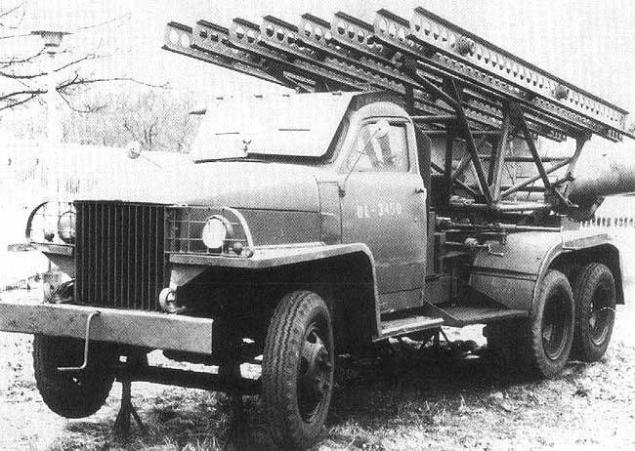
Coming out of the area of Yelnya Roslavl, she, along with many of our troops was encircled. In the area Roslavl Nazis were preparing to force the river Snopati. The battery on the move gave volley at a concentration of enemy troops at the crossing, caused them heavy losses, turned back and went to the forest roads Savior Demensk. Under the old Warsaw highway Spas De Mensk and Yukhnov already solid mass moving fascist troops.
By the evening of October 4 battery is left in the area Savior Demensk. The Germans, advancing in this direction have already captured Yukhnov and joined in the area of Vyazma with his northern group. Escape routes our troops out of Yelnya and Smolensk were cut off.
To reduce the size of the battery string that was too cumbersome - it is difficult to maneuver - day October 6 Captain Flerov ordered the destruction of the trucks. And besides, and not enough fuel.
Before you move on, in the evening on October 6 Flerov told his subordinates:
- All of our fighting installation prepared for detonation. ORDER: if the battery will be in a completely hopeless situation, fighting installation explode. I'll be at the head. Follow me. We all swore that the enemy is not in any way do not know about our new weapons ...
Flerov looked watchful eye of soldiers and officers. All is calm, panic in the battery will not be ...
Before nightfall, still light, battery Flerov stopped at the edge of the forest. Then you have to pass another 5-6 kilometers of the open field by field road barely noticeable. About halfway back from the road, it was a village of Bogatyr.
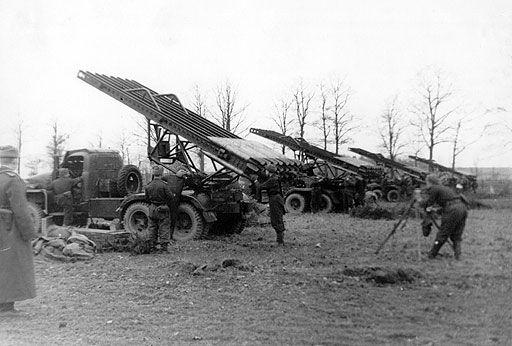
The captain called a group of scouts and sent them to the car ahead. He ordered them to drive the field, to go deep into the forest for 5-8 kilometers on the way back to the village to check the Bogatyr and return to the report.
It was dark when the scouts returned.
- The way is clear, in the forest and in the village there were no Germans.
- Then we have to move forward at a distance of no more than half a kilometer! - Flerov ordered. - Look carefully! If you find anything dangerous, immediately signaled by shooting or by any other means.
The car moved forward scouts ahead. A few minutes after it went column battery. Machinery came with headlights off, one after another. At the head of the column, in the cockpit of the first fighting installation were Captain Flerov and the head of the sanitary batteries voenfeldsher Avtonomova.
When the battery is abreast with the village of Bogatyr captain I saw silhouettes of people, guns. At the same moment the front, left and right almost point-blank Germans opened heavy fire from machine guns and mortar shells. In the sky, the rocket shot up, cast light on the field. Their pallid glow of the captain saw a large enemy ambush, apparently prepared in advance. It blocks the way. Scouts Nazis apparently deliberately missed forward without finding himself.
Right and left motors purred not tanks, not self-propelled guns. It was clear that the Germans want to take the battery in a pincer to grab her boevk installation.
The captain realized that the situation is hopeless. As soon as the fighting began, he opened the cab door, pushed to the ground Avtonomova shouted to her:
- Make your way into the forest, still you do not help us! ..
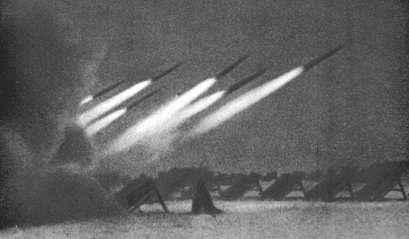
Jumping out of the car, he ran up to the second installation of the combat, which is 5-6 meters behind the battery sergeant led the party organizer Nesterov. At that moment he felt his blow to the jaw staggered but stayed on his feet. From cheeks stream bled. Supporting jaw hand, he shouted:
- Nesterov, driving back and let the installation volley quickly!
Returning to the first installation of the combat, the captain, already seriously wounded, barely climbed into the cab. Installation Commander Sergeant Ovsov jumped from the ground to help Flerov. But he did not make the five steps that separated him from the car. In the light of missiles sergeant saw the captain, leaning heavily over the wheel of the car, grabbed the control stick and spun it on the volley.
Victor paused, then looked at me a searching look, said:
- You probably will not believe what I was going to tell. This travel of various kinds. Here Yelnia, for example, where MLRs at the same time we made their first shots, too, for some reason, it's a new weapon called the "Katyusha". But in our sector of the front all that happened was some romantic connotation. At the foot soldiers in the first days of fighting was a nurse Katya. It featured a special neatness. About her jokingly said: sister, he says, carries with it an electric iron - so it all clean, ironed, fresh. Iron, however, no one has seen.
So, when he worked our setup, some wag joked that the difficult moment of the enemy attack the nurse decided to run for the Germans hid the electric iron. Of the iron and then the Red Army did not notice. But the heat of flying out of "Iron" in the direction of our trenches, observed by all. "Irons" fell on Fritz, as a terrible vengeance, and ironed with unprecedented effect.
When we began our counterattack, the Red Army with the running back and the nurse - blond, light. She seemed to be inspired by the Marines in this spontaneous, extremely powerful counterattack. Her name was all with the same tenderness Katusha. And many, like me after this fight seemed that the MLRs was in honor of our nurses so quickly, easily and securely christened it was a good Russian name.

Night July 3, 1941 in Moscow on Mozhaisk highway came a strange appearance of the military. Her column is stretched out on the road for about two kilometers. At the head of the column had seven machines that resembled a farm some carefully sheltered huge cover of dark green tarpaulin. Then it went more than fifty cars long drawers, nestled as tarpaulins, fuel trucks, vehicles with soldiers, field kitchen and all sorts of economic assets. It is quite unusual in this column looked like one single howitzer.
- What part? - Interested in the soldiers and officers of other units on their way to front.- why rush?
- Pontoon - smartly answered from kolonny.- rush to the front, to build bridges on the road on which the fascists will go to hell.
- And what for howitzer hitched, warriors? The fish is, perhaps, turn off?
- The farm is useful ...
On the front was the first private rocket artillery battery, while only one in the Red Army and the world, of the artillery, which was later on the front and in the rear called affectionate name of "Katyusha". It was the ancestor of the new formidable Soviet weapons, which played a prominent role in the defeat of the fascist hordes and which now, transfigured and developed on a new basis, became the main firepower of the Soviet Armed Forces ...
Firstborn new weapons

June 28th, 1941 Faculty listener command the Artillery Academy Dzerzhinsky Captain IA Flerov, has just successfully passed the exam for the first year of the academy, was urgently summoned to the headquarters of the commander of the artillery of the Red Army. There he was immediately carried to the office of General VV Aborenkova.
- I declare you have just signed an order - General began after Flerov introduced emu.- you first appointed commander of the Red Army in a separate battery of rocket artillery. You know what it is?
- No, Comrade General. Nothing was heard of such arms.
- It does not matter, will be introduced. Like any outstanding inventions, it is extremely simple to operate. However, the world is still no commander controlling such weapons. You will become the first officer, in whose hands is concentrated the fire unseen, a gigantic power. You passed all the fighting is now installed and ammunition.
- May I ask, Comrade General, where there is a battery and how much time I located her combat training?
- Batteries, my dear, not yet. There is only the order of its formation. And you will create it. Here in Moscow. You will be our representative - Colonel Krivoshapov and industry representatives, who together with you and go to the front to enter the battery in the fight.
The general got up, went to the captain, rose from his chair. Staring into his eyes, he said:
- To trust the military and state secrets of paramount importance. I stress paramount importance! Your part will be the progenitor of a new kind of troops, which owns a great future. In all circumstances the enemy should not get any information about this armed. The stalemate fighting installations and munitions batteries must be blown up.
Experienced martial installation of this new kind of weapons were created in 1939, but for various reasons have not arrived at the same time the Red Army. Only June 21, 1941 the Soviet government adopted a resolution on the mass production of missiles "M-13" and the combat units "BM-13».
Baptism of fire

I wandered battery captain Flerov on the front line the roads, not finding a combat use.
Early in the morning of July 14, Lieutenant Colonel Krivoshapov captain Flerov went to the headquarters of the Western Front. There they took General GS caryophyllene.
- The Germans scored Orsha railway junction military echelons, - said the general order you to attack the purpose. Prepare well for possible salvo at crossings that Nazi troops erected across the Dnieper and Orshitsa. The challenge is clear?
- Jasna, Comrade General. The long-awaited battle of this work.
- So that's great! Proceed. I hope will be a successful baptism of fire.
In high spirits, and Flerov Krivoshapov returned to the battery and immediately went to the observation post. Martial installation uncovered and charged, went to the edge of the forest, and then to firing positions. The commander of the battery quickly prepared to fight all the calculations.
- Worried Ivan Andreyevich? - I asked Krivoshapov.
- A little worried, Alexander - frankly Flerov. - It is very tempting target, and had to wait for this moment for so long.
- Ready to Rumble! - Report to the captain commanding the firing squads.
- Note - said Flerov - fifteen hours fifteen minutes.
And right into the telephone:
- Volley!

The hollow in firing positions batteries, came with nothing comparable to a deafening roar and rattle. It seemed that there was something quite extraordinary. Raised huge black cloud of smoke and dust. Top shot up about a hundred missiles reserves clearly visible whitish curly jet quickly dissolved gases in the air.
A few seconds after volley at the railway junction with a heavy roar and glare began to explode one after the other missiles thermite.
The earth groaned. She was shaking like a fever. Rockets explode in the midst of hundreds of cars with troops, military equipment, ammunition, fuel. All instantly it has been included in the sea roaring fire. It seemed that the fire is burning even metal.
Mad Nazi officers and soldiers rushed in panic between burning with trains, asphyxiated by the smoke and hot air. Soon they began to explode wagons with ammunition and fuel tanks.
After five or six minutes after the salvo battery railway hub turned into a sea of fire. In the sky clouds of thick smoke rose.
On that day, few of the Nazis caught up in the railway junction, managed to escape. The fire did not stop for almost three days. He has absorbed hundreds of enemy soldiers and officers and a huge amount of military equipment.
So there was a baptism of fire battery.
Observing the results of the volley, Captain Flerov said Lt. Col. Krivoshalovu:
- Perhaps, you can report to the commander of the artillery and the Supreme Command that Soviet engineers and workers have created an excellent weapon! Presumably, the echoes of panic that arose today, the Nazis in Orsha, and to reach Berlin.
- Be sure to reach, - said Krivoshapov. - And you feel it myself - the Nazis organize the daily hunt for your battery to capture it, and in extreme cases kill. Be prepared for this. And yet, the hunt for the battery has already started: see what's going on in firing positions.
Determine the position of some obscure weapons have not scattered black clouds of smoke and dust, came to his senses enemy gunners rained down on them a massive fire. There was a large group of bombers rained explosive and fragmentation bombs. But combat units was not there: they hid in the forest immediately after the volley ...

Fascist forces hammered the approaches to the crossing of the Orsha-tsu. A continuous stream of the river slowly moving tanks, vehicles and wagons with troops, ammunition and fuel, was the infantry. Some of these troops have already crossed to the east bank, is taking a small bridgehead. All ferry was packed with troops and military equipment.
Here and smashing a volley struck battery. Ferried blown to pieces. At the bottom of the river fell tanks and vehicles, carrying soldiers and officers. Dozens of rockets exploded on the banks of the river, causing death and destruction. Blaze tanks, vehicles with ammunition and fuel trucks. Among survived the Nazis began unimaginable panic.
Our took advantage of the favorable situation and caused a rapid attack on the Nazis, had time to cross to the east bank of the river. The prisoner was taken by a large group of enemy soldiers and officers.
Dejectedly walked Nazis under guard our soldiers. Having experienced the power of a devastating new Soviet weapons, they were mad with fear for a long time could not recover. Finally, one of them answered a question of our officer:
- It was a nightmare ... Not only our soldiers were panic-stricken. Even those who have been away from the ferry ran. It seemed that once fired hundreds of shells ...
The next day, Colonel Krivoshapov and industry to return to Moscow. Flerov was sorry to part with them, to the survivors of the hardships of forming the battery and putting it into action.

Soon after the first salvos battery captain Flerov Nazi Command to send troops directive "Russian have automatic multicore flamethrower gun ... Shot produce electricity. During the shot produced smoke ... The capture of such guns be reported immediately ... »
Early in the combat use of rocket artillery at the front gave conclusive results, although it is operated by separate panels. August 2nd, 1941 artillery commander of the Western Front denounced the artillery commander of the Red Army: a sudden fire batteries "M-13" causes great losses on the enemy, it turns into a stampede; Our part will come after volleys of these batteries, do not usually meet resistance enemy prisoners show that infantry panic runs not only from the areas in which fire a volley, but also with neighboring, at a distance of one-half kilometer from the place of the volley.
This powerful and maneuverable firepower, the Red Army has never had. His appearance on the battlefield was one of the largest makers of creative victories of Soviet arms.
Trapped

In many battles could participate battery captain Flerov: Smolensk, again near Orsha, near the famous Solovevsk while crossing the Dnieper in the counterattack by our troops Yelnia under Roslavl.
That just did not take fascist command to capture or destroy the battery Flyorova "hellish meat grinder," as the Germans called the new Soviet weapons. The fierce aerial bombardment and shelling of its hurricane firing positions after each volley, dele subversive groups, scattering leaflets from planes with calls to surrender these weapons fascist command or even destroy it. Traitors who would perform this task, the Nazis promised the highest orders of the fascist army, huge sums of money and sending to the rear of the German "to enjoy all the benefits of life».
However, the battery remained invulnerable. She always had time to escape the bombing and shelling. Soldiers and officers of the battery sometimes their own, sometimes with the help of neighboring departments were caught and destroyed the enemy saboteurs and fliers with lavish promises of Hitler's command was collected and burned.
In October 1941, the fate of the battery tragically cut short, and, until recently, this one did not know much. It was known only one thing: on the night of October 3, 1941 battery is left in a band fighting the 43rd Army on the Western Front in the direction of the town of Roslavl, the day the relationship with her was lost and restore it failed. The fate of the personnel of the battery did not reliably known. Not preserved any documents about the combat activities of the batteries.
What happened to the battery captain Flerov at the beginning of October 1941?

Coming out of the area of Yelnya Roslavl, she, along with many of our troops was encircled. In the area Roslavl Nazis were preparing to force the river Snopati. The battery on the move gave volley at a concentration of enemy troops at the crossing, caused them heavy losses, turned back and went to the forest roads Savior Demensk. Under the old Warsaw highway Spas De Mensk and Yukhnov already solid mass moving fascist troops.
By the evening of October 4 battery is left in the area Savior Demensk. The Germans, advancing in this direction have already captured Yukhnov and joined in the area of Vyazma with his northern group. Escape routes our troops out of Yelnya and Smolensk were cut off.
To reduce the size of the battery string that was too cumbersome - it is difficult to maneuver - day October 6 Captain Flerov ordered the destruction of the trucks. And besides, and not enough fuel.
Before you move on, in the evening on October 6 Flerov told his subordinates:
- All of our fighting installation prepared for detonation. ORDER: if the battery will be in a completely hopeless situation, fighting installation explode. I'll be at the head. Follow me. We all swore that the enemy is not in any way do not know about our new weapons ...
Flerov looked watchful eye of soldiers and officers. All is calm, panic in the battery will not be ...
Before nightfall, still light, battery Flerov stopped at the edge of the forest. Then you have to pass another 5-6 kilometers of the open field by field road barely noticeable. About halfway back from the road, it was a village of Bogatyr.

The captain called a group of scouts and sent them to the car ahead. He ordered them to drive the field, to go deep into the forest for 5-8 kilometers on the way back to the village to check the Bogatyr and return to the report.
It was dark when the scouts returned.
- The way is clear, in the forest and in the village there were no Germans.
- Then we have to move forward at a distance of no more than half a kilometer! - Flerov ordered. - Look carefully! If you find anything dangerous, immediately signaled by shooting or by any other means.
The car moved forward scouts ahead. A few minutes after it went column battery. Machinery came with headlights off, one after another. At the head of the column, in the cockpit of the first fighting installation were Captain Flerov and the head of the sanitary batteries voenfeldsher Avtonomova.
When the battery is abreast with the village of Bogatyr captain I saw silhouettes of people, guns. At the same moment the front, left and right almost point-blank Germans opened heavy fire from machine guns and mortar shells. In the sky, the rocket shot up, cast light on the field. Their pallid glow of the captain saw a large enemy ambush, apparently prepared in advance. It blocks the way. Scouts Nazis apparently deliberately missed forward without finding himself.
Right and left motors purred not tanks, not self-propelled guns. It was clear that the Germans want to take the battery in a pincer to grab her boevk installation.
The captain realized that the situation is hopeless. As soon as the fighting began, he opened the cab door, pushed to the ground Avtonomova shouted to her:
- Make your way into the forest, still you do not help us! ..

Jumping out of the car, he ran up to the second installation of the combat, which is 5-6 meters behind the battery sergeant led the party organizer Nesterov. At that moment he felt his blow to the jaw staggered but stayed on his feet. From cheeks stream bled. Supporting jaw hand, he shouted:
- Nesterov, driving back and let the installation volley quickly!
Returning to the first installation of the combat, the captain, already seriously wounded, barely climbed into the cab. Installation Commander Sergeant Ovsov jumped from the ground to help Flerov. But he did not make the five steps that separated him from the car. In the light of missiles sergeant saw the captain, leaning heavily over the wheel of the car, grabbed the control stick and spun it on the volley.


